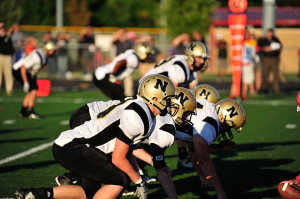Brian Cramer, Certified Athletic Trainer, Riverview Hospital
 Concussions and student athletes are a hot topic in the news these days. And while there’s a lot of information out there, some may still be wondering what all the fuss is about. Brian Cramer, a certified athletic trainer at Riverview Hospital, explains how concussions are a much bigger problem than we think. In fact, research shows athletes who experience repeat concussions have a much higher risk of long-term brain damage, including symptoms of dementia.
Concussions and student athletes are a hot topic in the news these days. And while there’s a lot of information out there, some may still be wondering what all the fuss is about. Brian Cramer, a certified athletic trainer at Riverview Hospital, explains how concussions are a much bigger problem than we think. In fact, research shows athletes who experience repeat concussions have a much higher risk of long-term brain damage, including symptoms of dementia.
So, as the parent of a student-athlete, what can you do to help protect your child? First thing first—know the signs of a concussion. Most concussions occur without a loss of consciousness and, at times, can be tough to recognize. If your child takes a hit during a game, watch for these symptoms, which can indicate a concussion:
- Appears dazed or stunned.
- Is confused about assignment or position.
- Is unsure about game, score or opponent.
- Answers questions slowly, or can’t remember anything before or after being hit.
If your child plays a high school sport in Indiana, there’s a new law that went into effect July 1, 2012, that’s designed to take the guesswork out of it by setting specific rules for concussion management. So what is this new law—and what does it mean for high school athletes? It means you, your child, and his or her coaches, will receive education on the causes, symptoms and risks of concussions. It also means a licensed healthcare provider, trained in the evaluation and management of concussions and head injuries, must evaluate and clear any student suspected of having a concussion. And most importantly, it means all athletes who suffer a concussion will undergo a uniform return-to-activity protocol before they’ll be allowed to play again.
“This is a huge step forward for the well-being of our athletes,” says Cramer. “At Noblesville High School—and at many other high schools across the state—athletes are required to have a baseline or pre-concussion ImPACT test before participating in any sports. We also encourage club athletes to do the same, because concussions can happen in those sports as well.”
The ImPACT test is a computerized neurological assessment test that, when compared to the baseline test, can be used to help determine if an athlete has a concussion and when they are able to return to their sport.
Team sports are a great experience and keeping our kids safe should a top priority for all athletic programs—high school or otherwise. The concussion and head injury law is a great step forward and, when paired with the ImPACT testing, can make sports safer and can reduce the risks of long-term brain injuries.
For more information on ImPACT testing and concussion management visit riverview.org.
